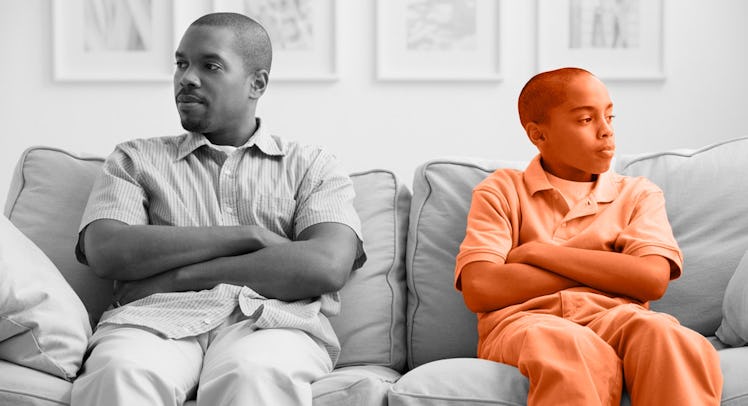When to Fight With a Kid and When to Just Give Up
The most important parts of arguing with a child are knowing what you’re arguing about in the first place and understanding it’s okay for them to win.

A child’s natural curiosity and egocentrism can easily lead to arguments with parents. There’s nothing like a well-placed “but why?” to draw a verbal disagreement toward tedium. And, at some point, even the strongest-willed parents will feel the urge to give up on an argument. The important part is knowing when to walk away and just how to do it.
“You should never give up on important big issues, but you should frequently give up on small things that don’t matter,” explains Dr. Nancy Darling, Oberlin College Psychology Professor and author of Thinking About Kids on Psychology Today. She adds that “there are plenty of times you should walk away from a discussion so you can come back to it knowing you’re going to resolve it.”
When to Walk Away from an Argument with a Child
- Walk away from little issues that are matters of opinion and personal preference.
- Stick with arguments related to health, safety, and morality.
- Understand that it’s okay to change your mind and let a child win.
- Hit the pause button and come back to the argument later by summarizing both sides of the argument and taking a break to think.
Of course, the trouble for many parents is in discerning what the “big issues” are. After all, parenting has a reputation for producing acute myopia that makes it easy to confuse a need for power and control with things that need-to-happen-now-or-else. So how does a parent tell the difference between the hills they should die on and the hills they shouldn’t?
RELATED: How Arguing With Your Partner Can Hurt (And Sometimes Help) Your Kid
Darling has a litmus test that could help: “Is this an area that is a legitimate domain for you to exert authority,” she asks. “Or is this something where you really want to persuade, but it’s really not your business?”
Examples of legitimate domains include issues of health and safety and issues related to morality. Everything else? It’s largely a child’s personal choice. For instance, a parent could say: “Don’t play the Wiggles so loud because it’s disturbing other people.” However, they shouldn’t say, “You’re not allowed to like the Wiggles because I find them annoying.”
Understanding the difference between what parents should argue about and what they shouldn’t requires that they ask themselves why they’re in the argument in the first place. If they have a reason that connects to health and safety and morality, then it’s important parents stand their ground. If they can’t come up with a compelling reason outside of “because I want it to be that way,” then they might be on the wrong path.
ALSO: How and When to Intervene in Playground Fights Between Kids
Another reason to bail on an argument is when the argument is dragging on specifically because a parent wants to win. Darling explains it like a Buddhist koan: “If the argument is about winning the argument, you’ve lost the argument,” she explains.
Darling also stresses that there’s nothing particularly damaging in walking away from an argument. In fact, it can be healthy for a parent/child relationship. “Letting a child win an argument is a great way to increase your authority,” she notes. “Because you want them to know when they come to you with a disagreement, you’ll argue it out and then sometimes they win. There’s nothing wrong with changing your mind.”
But to reach a place where they can change their minds, parents may sometimes need time and space to think. A time-out for contemplation is completely reasonable with the right communication. Darling suggests that parents hit the pause button by repeating both sides of the argument back to the child for clarity and letting them know that the discussion will resume later.
MORE: Smart Advice For WhenYou Disagree Over What’s Really Risky For Your Kid
Darling also notes that there are arguments over little things that may return again and again. That’s fine. She herself has been arguing with her son since December over whether or not Vice Admiral Amilyn Holdo in the Last Jedi is an effective leader. “We’re not going to settle this argument,” she says. “We don’t have to come back to it but we will.”